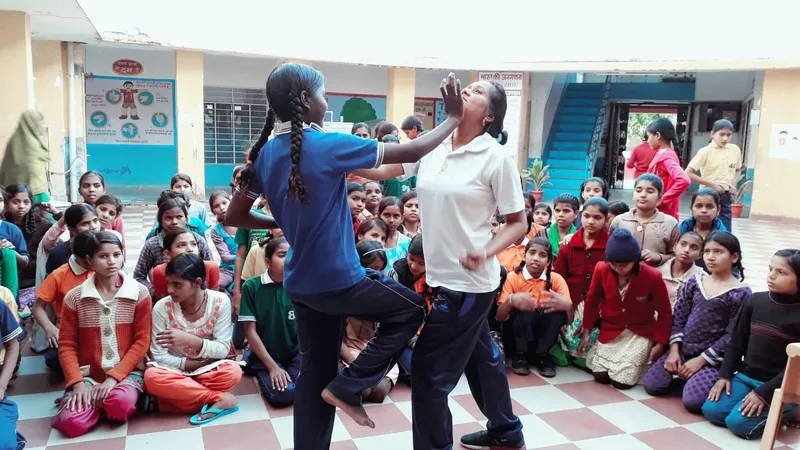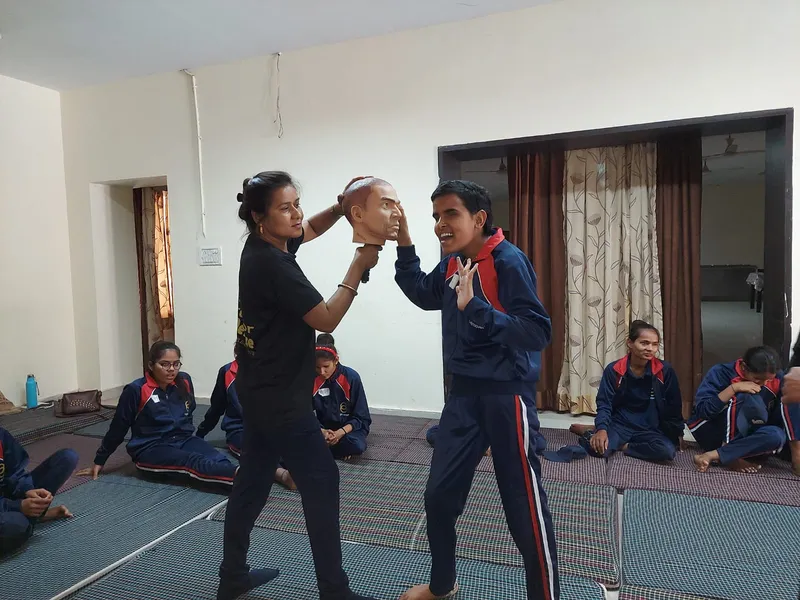A class apart: This Hindi teacher is training women to block, strike and take control of their lives
Asha Suman, a government school teacher in Alwar, Rajasthan, imparts self-defence training to women and school-going girls. Since 2015, she has trained around 30,000 women in Rajasthan.
Block, grapple, and strike—these are not just pillars of defence that Asha Suman teaches in her self-defence classes for young women, but they also perhaps serve as tenets to build self-reliance and confidence in the long run.
In 2015, Suman—a government school teacher in Alwar, Rajasthan—took it upon herself to teach self-defence to girls and young women, so that they could protect themselves in times of need. Since then, she has trained around 30,000 women in Rajasthan, including 250 girls with hearing disabilities or visual impairment and some elderly women.
“I wish to empower and guide them to become champions of their own safety and that of others,” she says.
Suman, who teaches Hindi at a local school, spends after-school hours and holidays imparting self-defence training, using a mix of techniques from Taekwondo, Karate and other martial art forms. Each session consists of around six days. She also gives online training to nearly 8,000 teachers across 24 states in the country.
Turning point

Asha Suman (right)
When Suman began her job as a Hindi teacher in 2005, there were just 20 students in the entire school, which lacked proper facilities and infrastructure. The nearest motorable road was 3.5 kilometres away from the school.
With the support of the village sarpanch, Suman convinced parents of the village to make education a priority for their children. Her efforts bore fruit, and, in two years, the student strength at the school soared to 120. As a result, the education department constructed a proper building for the school in 2007.
Then there was a huge upheaval in 2014, when a minor girl with speech impairment and intellectual disabilities was raped by four village boys at a field near the school.
“When I went to see the girl, I could not help but think that, had she known self-defence, she might have been able to save herself,” says Suman.
The incident sent shock waves across the village, and there was a dip in the number of girls attending school. Suman herself feared for her safety, as she had to walk through the field alone. But she did not want the incident to hamper the girls’ education.
“I went to the houses of the girls and tried convincing their families. I tried to explain to them the importance of education. I also started accompanying the girls from their homes on my two-wheeler,” she recalls.
Nevertheless, it took over two months for the girls to gain confidence and come back to school.
Meanwhile, Suman was nursing a deep desire to learn and teach self-defence. So, she attended a course in self-defence at the Police Academy in Jaipur in 2015.
“After completing the course, there was no turning back. I embarked on a journey to empower these girls to take control of their own safety,” she says.
Suman has also undergone training at the Combat Tactical Association in Mumbai on how to teach self-defence to girls who are visually challenged, mute, or have hearing impairment.
Making girls resilient and confident

Asha Suman training a specially-abled girl
Suman explains that self-defence training is 90 per cent a mental effort and only 10 per cent physical. She also emphasises the idea of harnessing one’s body as a weapon.
She commences her class by instructing her students on the importance of disengaging from escalating situations and how to seek help in emergencies.
Negotiation is the first step of handling any tough situation, says Suman. She advises her students to resort to physical defence only when all other options are exhausted and the situation is beyond their control.
Later, she conducts outdoor training sessions on skills such as kicking, blocking techniques, and strategic methods of attack.
She also educates her students about the vulnerable areas in the human body that can be targeted during self-defence and imparts information on laws pertaining to the safety of women and relevant helplines.
Suman uses common activities, like kicking a football, to help specially-abled girls learn attack positions. She also uses a dummy to help them sense if someone is following them. She adopts a range of techniques to train the girls—including striking an attacker with a bent elbow and hitting them with kicks.
Monica, who is visually impaired, underwent Suman’s self-defence training last year. She says she has gained confidence after these classes.
“Since childhood, my parents have accompanied me wherever I went. Everyone feared for my safety. However, after taking self-defence training, I can now go out alone to nearby places. Additionally, I have this newfound confidence in me that I can protect myself,” she says.
Suman also collaborates with schools, colleges and villages to conduct free workshops on self-defence.
“Girls believe they are weak physically and so they won’t be able to fight men. But my life’s goal is to train them enough so that they can protect themselves. No matter where I am, I will keep training these girls and make them self-sufficient,” she says.
Edited by Swetha Kannan







